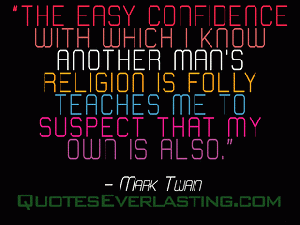
.The easy confidence with which I know another man's religion is folly teaches me to suspect that my own is also.. -Mark Twain
(Image by QuotesEverlasting) Details DMCA
.The easy confidence with which I know another man's religion is folly teaches me to suspect that my own is also.. -Mark Twain by QuotesEverlasting
Albert Einstein said, "Try and penetrate with our limited means the secrets of nature and you will find that, behind all the discernible laws and connections, there remains something subtle, intangible and inexplicable. Veneration for this force beyond anything that we can comprehend is my religion. To that extent, in fact, I am religious."
Religions are projections of our self image onto the subtle, intangible and inexplicable nature of the universe, to which he refers. They are anthropomorphic forms of explaining the seemingly unexplainable. They are arrogant attempts to compare ourselves to a creator, claiming our connection to it because we are made in its image. What have these attempts done for us?
Jon Stewart had the best answer when he said, "Religion is what gives people hope in a world torn apart by religion." Yet this whole human endeavor could have merit as long as we keep a key point in mind: Our attempts are simply that, attempts. They are not certainty!
Kurt GÃ �del, Austrian logician, mathematician and philosopher, gave us his incompleteness theorems, which showed that a consistent system cannot prove the axioms constituting the system. Therefore, there is a difference between what is provable within the system and what may be true apart from it.
What we have as a species is a plethora of these systems based on theory-dependent models of reality. All of our knowledge is limited to human theories.
Religions, correspondingly, are theory dependent models that have many internal contradictions. We cannot call them consistent systems. We can only call them theory-dependent models that cannot prove their own axioms or completely explain what may be true. In simple terms, a logical proof in any system is not necessarily evidence of truth.
Generally speaking, we do not question the logic, which shapes our thinking. We come to conclusions based on unexamined premises embedded in this logic and assume it explains the world around us. We are like fish in water--we live in our logic, unaware of its existence.
We could benefit from deconstructing the beliefs that evolve from our thinking. Why the beliefs? Beliefs are apparent, but are based on deeply embedded unexamined premises in our logic, which--as stated above--are transparent.
Just as a physician examines our vital signs for symptoms of deeper illnesses, we should examine one of the vital signs of our societies: our religious belief systems. That is, if we are to discover the deeper failings of our logic.
In addition to the failure of our logic to provide sufficient evidence for comprehensive explanations, we are also faced with another factor to consider, which is, the core question of epistemology: How do we know what we know? Until we reconcile our epistemologies, we are bound in independent recursive systems of thinking, i.e., religion is one of those recursive systems.
In other words, this significant domain of inquiry is self-referential, meaning it depends on its own axioms to prove its axioms. The works of this important area of human inquiry are contained in our texts. From the earliest to the most recent, our scientific texts contain the empirically derived evidence that make up the whole of scientific knowledge; not our wisdom. For that we look to our philosophies; religions in this case.
Contemporary French philosopher, Jacques Derrida, is credited with the term deconstruct, which means to subject a text to critical analysis.
From philosopher, Richard Rorty, "Deconstruction generally tries to demonstrate any text is not a discrete whole, but contains several irreconcilable and contradictory meanings; that any text therefore has more than one interpretation; that the text itself links these interpretations inextricably; that the incompatibility of these interpretations is irreducible; and thus that an interpretative reading cannot go beyond a certain point."
So a final admonition to us all: When arguing for or against religion, don't be so sure of your positions.
Robert De Filippis





